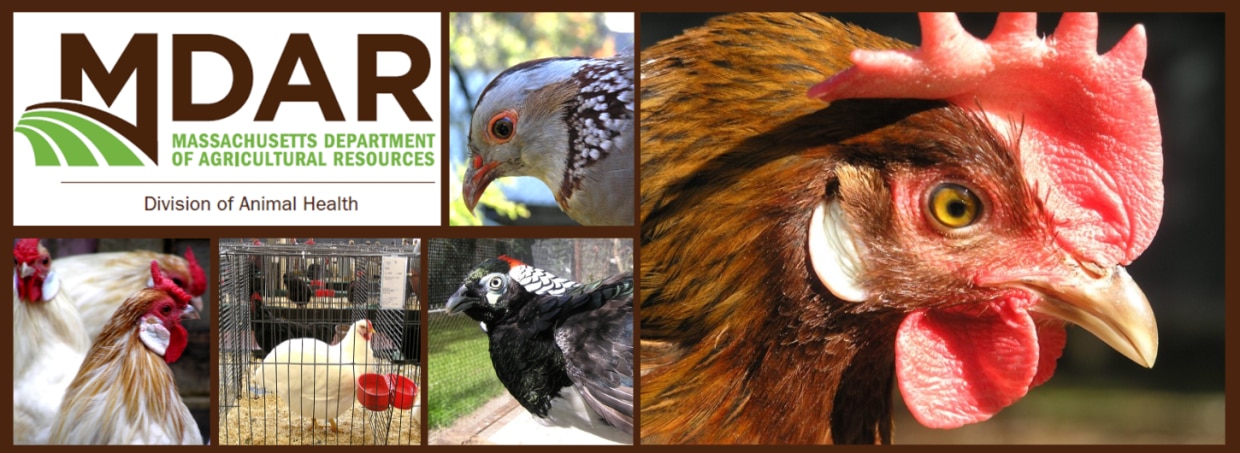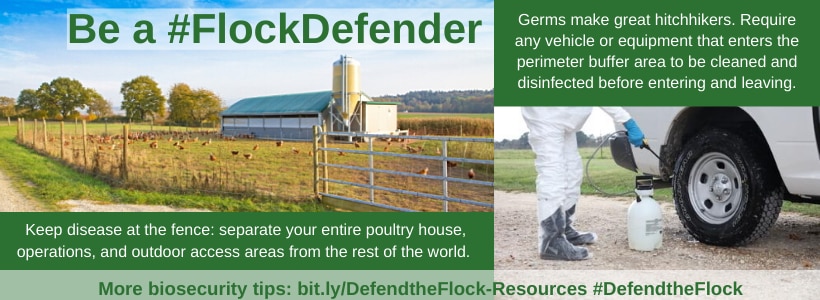Diagnostic Testing and Disease Updates
Diagnostic Testing Services for Salmonella pullorum and Avian Influenza in poultry and the avian species listed above is available to all residents of the commonwealth who plan to sell, exhibit, or otherwise move birds off of their premises.
Report sick or dead birds!
Sick or dead domestic poultry (chickens, turkeys, gamebirds, domestic ducks, etc.) should be reported to Department of Agricultural Resources Division of Animal Health at 617-626-1795 or through the Report Sick or Dead Domestic Poultry link.
Sick or dead wild birds should be reported to the Department of Fish and Game Division of Fisheries and Wildlife (MassWildlife) using the online form found the Report Sick or Dead Wild Birds link.
Visit USDA’s HPAI Detection Page for information on cases in Wild birds, Domestic Poultry and Mammals
For more information about the Avian Influenza virus
Protect Your Flock - Biosecurity Information
MDAR’s Poultry Biosecurity available in English, Español, Português, 简体中文, Tiếng Việt, عربي, Kriolu di Cabo Verde, Français, Kreyòl ayisyen, ភាសាខ្មែរ, Русский,
Prevent exposure to Highly Pathogenic Avian Influenza virus in your Poultry Flock
Biosecurity Information For
Poultry Dealers and Transporter Licenses
Be advised that pursuant to MGL Chapter 94, Section 152A, “No person or business entity shall engage in the business of buying, selling or transporting live poultry unless he shall have first obtained a license therefore from the Division of Animal Health. Such license shall expire on December thirty-first in the year or part thereof in which such license was issued. Currently there is no fee for this license.
All licensees shall keep and maintain, for a period of one-year records of each transaction as follow:
- Date of transport;
- Name of seller & address;
- Name of Purchaser & address;
- Total number of birds transported;
- Species of poultry bought;
- Species of Poultry sold; and
- Pullorum Certificate, the number, and the certificate expiration*
*Adult poultry** entering the Commonwealth of Massachusetts must be accompanied by proof of an NPIP approved negative test for salmonella pullorum-typhoid and an NPIP/ VS 9-3 form, issued by the state of origin. Day old chicks and hatching eggs must originate from flocks that are NPIP salmonella pullorum-typhoid negative and be accompanied by an NPIP/ VS 9-3 form issued by the state of origin.
**The definition of “Poultry” in regard to testing requirements includes chickens, turkeys, guinea fowl, and gamebirds.
All other avian species require a general health certificate for entry into the commonwealth.
If you have any questions, please call 617-626-1795.

